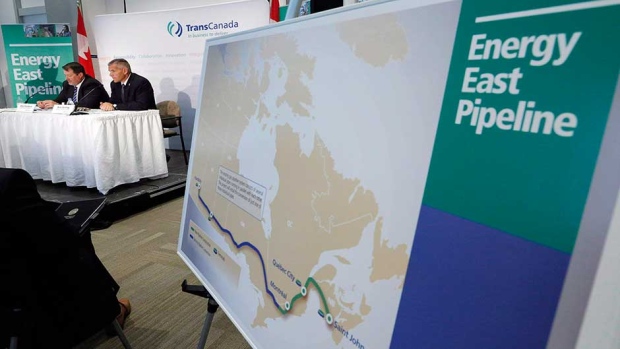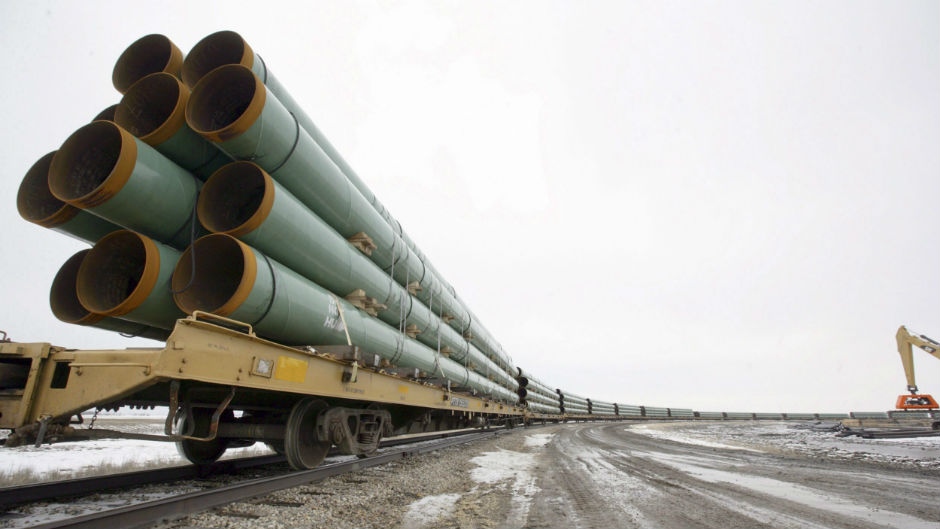Oct 5, 2017
TransCanada pulls the plug on Energy East pipeline project
The Canadian Press

CALGARY -- TransCanada has cancelled plans for the Energy East pipeline and Eastern Mainline projects that were to take Alberta oilsands production to Quebec and New Brunswick.
The Calgary-based company (TRP.TO) had announced last month that it was suspending its efforts to get regulatory approvals for the mega projects.
It will now inform the federal and provincial regulators that it will no longer be proceeding with its applications for the projects.
"After careful review of changed circumstances, we will be informing the National Energy Board that we will no longer be proceeding with our Energy East and Eastern Mainline applications," TransCanada CEO Russ Girling said in a statement Thursday.
He added that TransCanada will also withdraw from a Quebec environmental review.
Energy East had been proposed as a way to move Alberta oilsands production as far east as an Irving Oil operation in Saint John, N.B.
Its supporters said Energy East was necessary to expand Alberta's markets and decrease its dependency on shipments to the United States. Detractors raised questions about the potential environmental impact.
New Brunswick Premier Brian Gallant expressed disappointment in the cancellation and said he believes the project's decision is because recent changes to world market conditions and the negative impact of lower oil prices.
"We believed if TransCanada continued with the process, the project would be approved. We still believe that," Gallant said.
WEIGH IN

What do you think was the death knell for Energy East?
TransCanada said it will record a non-cash charge of about $1 billion in its fourth-quarter financial results, reflecting the reduced carrying value of the projects. It said there would be no costs recovered from third parties.
But Girling assured investors that he expects TransCanada's the annual dividend will grow at the upper end of a long-term target range.
"We will continue to focus on our $24 billion near-term capital program which is expected to generate growth in earnings and cash flow to support an expected annual dividend growth rate at the upper end of an eight to 10 per cent range through 2020," Girling said.
Meanwhile, Montreal Mayor Denis Coderre celebrated the Energy East announcement on Thursday, suggesting in a series of tweets that citizen groups and local politicians from the Montreal-area played a key role in putting a stop to the project.
Coderre and numerous other elected officials had argued the environmental risks associated with it far outweighed the economic benefits.
"The abandonment of the Energy East project is a major victory for the municipal world," Coderre wrote.
- ‘An unfortunate outcome’: Experts weigh in on TransCanada’s Energy East decision
- Notley 'deeply disappointed' by Energy East cancellation
- 'A glorious day for Donald Trump': Ex-N.B. Premier slams Canadian energy policy
READ MORE: ENERGY EAST
Coderre also thanked local Indigenous groups for their leadership on the pipeline file.
Alberta Premier Rachel Notley said her government was "deeply disappointed" by the decision.
"We understand that it is driven by a broad range of factors that any responsible business must consider," she wrote in a statement. "Nonetheless, this is an unfortunate outcome for Canadians."
"We believe this nation-building project would have benefited all of Canada through new jobs, investment, energy security and the ability to displace oil being imported into Canada from overseas and the United States."
Energy East would have been a 4,500-kilometre pipeline, which would have carried crude from Alberta and Saskatchewan to Saint John, N.B. and other parts of Eastern Canada.
--With files from BNN





